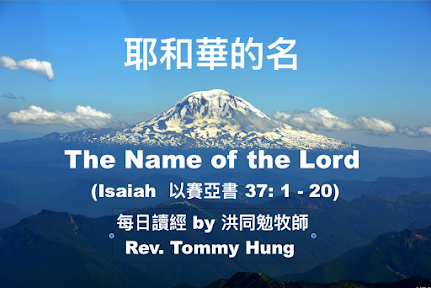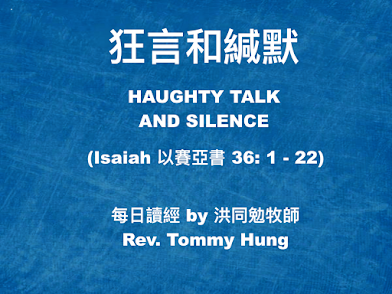主阿! 人的知識、能力有限, 求主可憐!
O Lord, men’s knowledge and abilities are limited, have mercy on us!
神掌管歷史
GOD IS IN CONTROL OF HISTORY
經文: 以賽亞書 卅七 21-38
SCRIPTURE READING: Isaiah 37:21-38
釋義 : 希西家祈禱之後,以賽亞就差人帶信息給希西家王,其中有四個要點:
Insight: After Hezekiah prayed, Isaiah had a servant send King Hezekiah a message which contains four key points:
- 定西拿基立的罪,並宣佈神決心要對付他。(21-23)西拿基立的罪乃在於辱罵、褻瀆以色列的聖者(這是以賽亞對神一個常用的稱號, 在書中出現廿五次, 而以賽亞書以外只有六次)。他率領許多戰車上山頂,到利巴嫩極深之處,這乃是一種傲慢自大的行動。
Convict Sennacherib’s sin and declare that God is determined to deal with him (21 – 23). Sennacherib’s sin involves mocking and reviling the Holy One of Israel - a name for God that Isaiah uses frequently; appears 25 times in the Book of Isaiah, and only 6 times elsewhere. Going up to heights of the mountains with many chariots, to the far recesses of Lebanon is an act of arrogance.
- 西拿基立沒有認清一個事實,就是他不過是耶和華的工具。(24-29)他所行的一切細節耶和華都暸如指掌,祂決心要強使他從原路轉回。
Sennacherib doesn’t have a good grasp of the fact that he is merely an instrument of the Lord. (24 – 29) The Lord knows about his every little move. He is determined to force him to return by the way he came.
- 為了確定這一點,以賽亞就給希西家一個證據。這段的格式與較早期對亞哈斯的兩篇談話相同(例如七10-17八1-8)。它以一個兆頭(即證據一字)為開始,正如七章十四節所說的以馬內利兆頭,一個帶時間性的事件。這個證據是指這地未來三年的景況。因為「自生的」(一個摘自利未記廿五5,11的農業上的技術用語)足夠生長兩年的時間,而一般的穀子是在第三個年頭收割。以賽亞預言三年內西拿基立必然敗退, 就如以馬內利「還不曉得棄惡擇善之先」(七16) 亞哈斯的敵人必然見棄。
To assure Hezekiah of God’s deliverance, Isaiah gives Hezekiah a sign. This passage has the same format as two earlier dialogues with Ahaz (example 7:10-17, 8:1-8): It starts with a sign (or ‘proof’). Just as the sign of Immanuel spoken of in 7:14, this is also a time sensitive event. The proof here is referring to the situation of Israel’s land in the coming 3 years. Since “what grows of itself” (an agricultural technical term taken from Leviticus 25:5, 11) , takes two years to grow, most grains are harvested in the beginning of the third year. Isaiah prophesies that Sennacherib will withdraw within 3 years, as in the sign of Immanuel, “before the boy knows how to refuse the evil and choose the good” (7:16), the land of Ahaz’s enemies will be deserted.
- 先知最後向王宣告他一直強調的一個事實,就是耶和華自己的話,「我為自己的緣故,又為我僕人大衛的緣故,必保護拯救這城。」(33-35)
Lastly, the prophet declares to the king a fact that he has been emphasizing: “For I will defend this city to save it, for my own sake and for the sake of my servant David.” (33 – 35)
整個故事顯示,假若我們瞭解真相,歷代以來人所自誇的成就,其背後都有神的主權。
The story shows that if we know the whole truth, we will understand that from generation to generation, the achievements that men boast about all have God’s sovereignty over them indeed.
美國學者皮爾德(Charles A. Beard)某次有人問他, 能否用最通俗的方法, 簡要指示人類歷史的教訓。他立即答道, 可用四句最簡單的話解答:
American historian Charles A. Beard was once asked if he could summarize the lessons of history. He responded immediately, “All the lessons of history in four sentences:
1.神如果要毀滅那個人, 便叫他發狂, 迷信他自己的權力。
Whom the gods would destroy, they first make mad with power.
2.神的磨子磨得很慢, 但磨得最細。
The mills of God grind slowly, but they grind exceedingly small.
3.蜜蜂盜取花粉, 卻反使花得以繁殖。
The bee fertilizes the flower it robs.
4.黑夜深了, 你才能看到星光。
When it is dark enough, you can see the stars.”
「洪水泛濫之時,耶和華坐著為王;耶和華坐著為王,直到永遠。」(詩廿九10)請放心, 神今天掌管歷史。
“The Lord sits enthroned over the flood; the Lord sits enthroned as king forever.” (Psalm 29:10) Let’s loosen up. God is in control of history today.
每日讀經 by 洪同勉牧師 Rev. Tommy Hung





